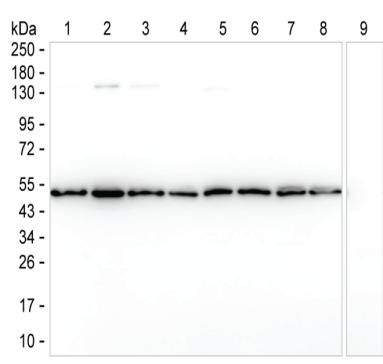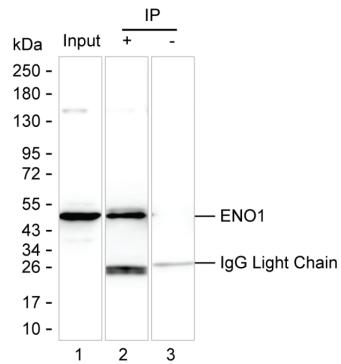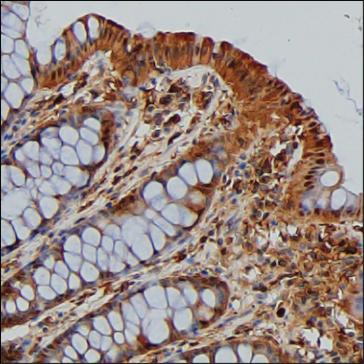


| WB | 咨询技术 | Human,Mouse,Rat |
| IF | 1/100-1/200 | Human,Mouse,Rat |
| IHC | 1/500 | Human,Mouse,Rat |
| ICC | 技术咨询 | Human,Mouse,Rat |
| FCM | 咨询技术 | Human,Mouse,Rat |
| Elisa | 咨询技术 | Human,Mouse,Rat |
| Host/Isotype | Mouse IgG1 |
| Antibody Type | Primary antibody |
| Storage | Store at 4°C short term. Aliquot and store at -20°C long term. Avoid freeze/thaw cycles. |
| Species Reactivity | Human |
| Immunogen | Purified recombinant fragment of human ENO1 |
| Formulation | Purified antibody in PBS with 0.05% sodium azide |
+ +
以下是关于ENO1抗体的3篇参考文献示例,涵盖其在自身免疫疾病和癌症中的研究:
---
1. **文献名称**:*Autoantibodies to enolase in systemic autoimmune disorders*
**作者**:Pratesi F, et al.
**摘要**:该研究检测了类风湿性关节炎(RA)和系统性红斑狼疮(SLE)患者血清中的抗ENO1抗体,发现其与疾病活动性相关,提示ENO1作为自身抗原在炎症和细胞凋亡中可能触发自身免疫反应。
2. **文献名称**:*ENO1 autoantibodies as a cancer biomarker*
**作者**:Terrier B, et al.
**摘要**:研究通过ELISA技术发现,乳腺癌和肺癌患者血清中抗ENO1抗体水平显著升高,表明其可作为潜在的肿瘤诊断标志物,并与肿瘤微环境中ENO1的异常表达相关。
3. **文献名称**:*Cross-reactive anti-ENO1 antibodies in post-streptococcal autoimmune sequelae*
**作者**:Fontán PA, et al.
**摘要**:探讨链球菌感染后,患者体内产生的抗ENO1抗体与宿主α-烯醇酶发生交叉反应,可能导致风湿热或肾小球肾炎,揭示了分子模拟在感染后自身免疫并发症中的作用机制。
---
以上文献反映了ENO1抗体在疾病诊断、机制研究及治疗靶点中的多重意义。如需具体文章,建议通过PubMed或Google Scholar按标题及作者名进一步检索。
**Background of ENO1 Antibody**
The ENO1 antibody targets enolase 1 (ENO1), a glycolytic enzyme encoded by the *ENO1* gene. ENO1. also known as α-enolase, catalyzes the conversion of 2-phosphoglycerate to phosphoenolpyruvate in glycolysis. Beyond its metabolic role, ENO1 exhibits "moonlighting" functions, including DNA binding, hypoxia response, and cell surface interactions, where it acts as a plasminogen receptor.
ENO1 is ubiquitously expressed in tissues but shows altered expression in pathologies. Overexpression is linked to cancers (e.g., lung, pancreatic, breast), where it promotes proliferation, metastasis, and chemoresistance. Conversely, autoantibodies against ENO1 are implicated in autoimmune diseases like systemic lupus erythematosus (SLE), rheumatoid arthritis (RA), and autoimmune retinopathy, often due to molecular mimicry or aberrant exposure during cell stress.
In research, ENO1 antibodies are used to study its dual roles in metabolism and disease. Clinically, they aid in diagnosing autoimmune conditions or monitoring cancer progression. Therapeutic strategies targeting ENO1. such as monoclonal antibodies or inhibitors, are under exploration to disrupt tumor growth or modulate immune responses. Challenges include distinguishing ENO1's isoforms and addressing its pleiotropic functions to minimize off-target effects. Overall, ENO1 antibodies are vital tools for unraveling its complex biology and translational potential.
×